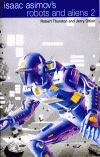I’ve been a bad reviewer lately. I usually try to write my reviews right after viewing or reading but I haven’t had as much time to write them lately. I’ve been playing World in Conflict quite a bit lately, which competes with my reviews here. I should actually do a review for that sometime, since I spend so much time playing it. It takes place in an alternate reality where the Soviets invade the US in 1990. For more information in the meantime just click the link above.
So, here are the things I have watched so far, but have yet to review:
- Blade Runner – The Final Cut
 : (I’ve watched the movie, which was awesome, but I still have to work through the rest of the special features on the last disc)
: (I’ve watched the movie, which was awesome, but I still have to work through the rest of the special features on the last disc)
- I am Legend (2007) – I’ve actually watched this twice, once with my Father while on vacation, and again with my wife
- Battlestar Galactica: Razor – Unrated Extended Edition

I’m also in the process of reading two books: Children of Dune by Frank Herbert , and The Age of Spiritual machines by Ray Kurzweil
, and The Age of Spiritual machines by Ray Kurzweil . The latter is not really science fiction, but I’m about half way through it and many of the ideas probably seemed like fiction back when it was published in 1999. Many of the predictions Kurzweil makes in the first half are fairly accurate, so I’m interested to see what he will say in the second half.
. The latter is not really science fiction, but I’m about half way through it and many of the ideas probably seemed like fiction back when it was published in 1999. Many of the predictions Kurzweil makes in the first half are fairly accurate, so I’m interested to see what he will say in the second half.
My next major milestone will be to read Chaos Theory, Asimov’s Foundations and Robots, and Herbert’s Dune: The Fractal Aesthetic of Epic Science Fiction .
.
That should keep me busy for a little while.


